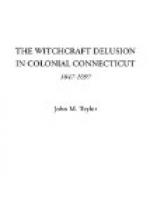CHAPTER IV
“Hence among all the superstitions that have ‘stood over’ from primeval ages, the belief in witchcraft has been the most deeply rooted and the most tenacious of life. In all times and places until quite lately, among the most advanced communities, the reality of witchcraft has been accepted without question, and scarcely any human belief is supported by so vast a quantity of recorded testimony.”
“Considering the fact that the exodus of Puritans to New England occurred during the reign of Charles I, while the persecutions for witchcraft were increasing toward a maximum in the mother country, it is rather strange that so few cases occurred in the New World.” New France and New England (pp. 136-144), FISKE.
The forefathers believed in witchcraft—entering into compacts with the Devil—and in all its diabolical subtleties. They had cogent reasons for their belief in example and experience. They set it down in their codes as a capital offense. They found, as has been shown abundant authority in the Bible and in the English precedents. They anchored their criminal codes as they did their theology in the wide and deep haven of the Old Testament decrees and prophecies and maledictions, and doubted not that “the Scriptures do hold forth a perfect rule for the direction and government of all men in all duties which they are to perform to God and men.”
Massachusetts, Connecticut, and New Haven, early in their history enacted these capital laws:
In Massachusetts (1641):
“Witchcraft which is fellowship by covenant with a familiar spirit to be punished with death.”
“Consulters with witches not to be tolerated, but either to be cut off by death or banishment or other suitable punishment.” (Abstract New England Laws, 1655.)
In Connecticut (1642):
“If any man or woman be a witch—that is, hath or consulteth with a familiar spirit—they shall be put to death.” Exodus xxii, 18; Leviticus xx, 27; Deuteronomy xviii, 10, 11. (Colonial Records of Connecticut, Vol. I, p. 77).
In New Haven (1655):
“If any person be a witch, he or she shall be put to death according to” Exodus xxii, 18; Leviticus xx, 27; Deuteronomy xviii, 10, 11. (New Haven Colonial Records, Vol. II, p. 576, Cod. 1655).
These laws were authoritative until the epidemic had ceased.
Witches were tried, condemned, and executed with no question as to due legal power, in the minds of juries, counsel, and courts, until the hour of reaction came, hastened by doubts and criticisms of the sources and character of evidence, and the magistrates and clergy halted in their prosecutions and denunciations of an alleged crime born of delusion, and nurtured by a theology run rampant.
“They had not been taught to question the wisdom or the humanity of English criminal law.” (Blue Laws—True and False, p. 15, TRUMBULL.)




